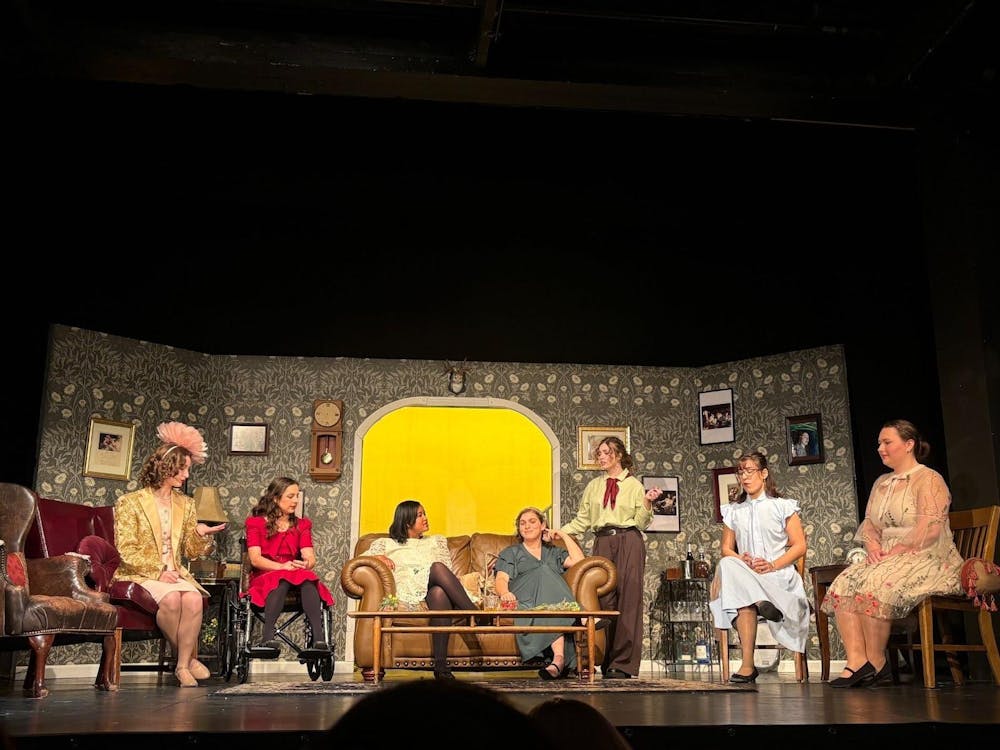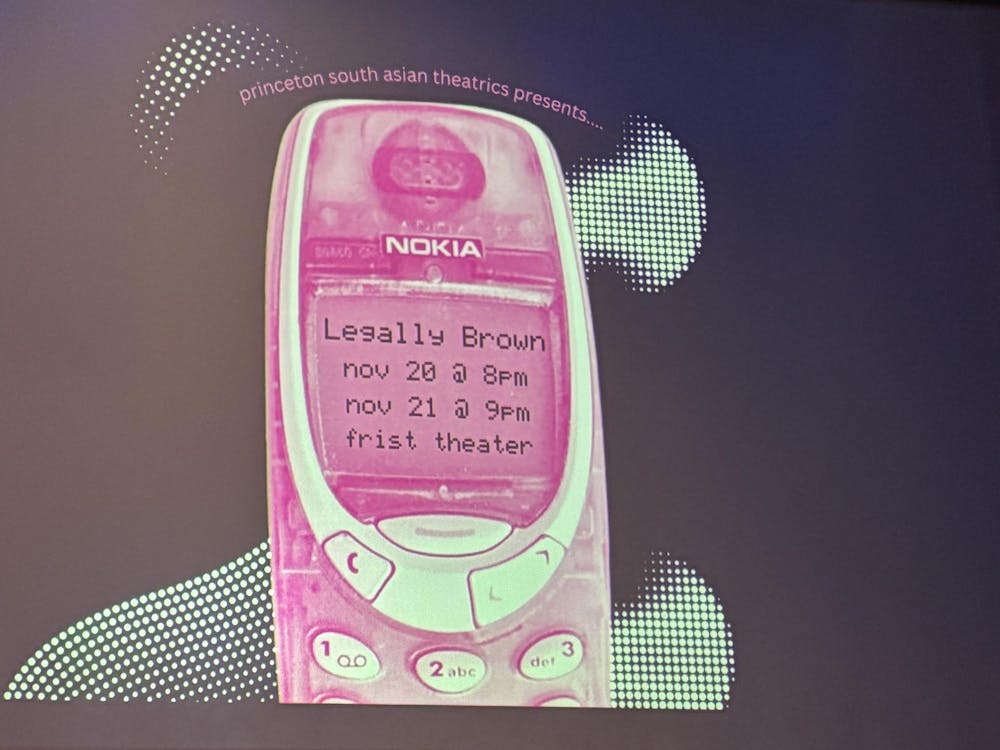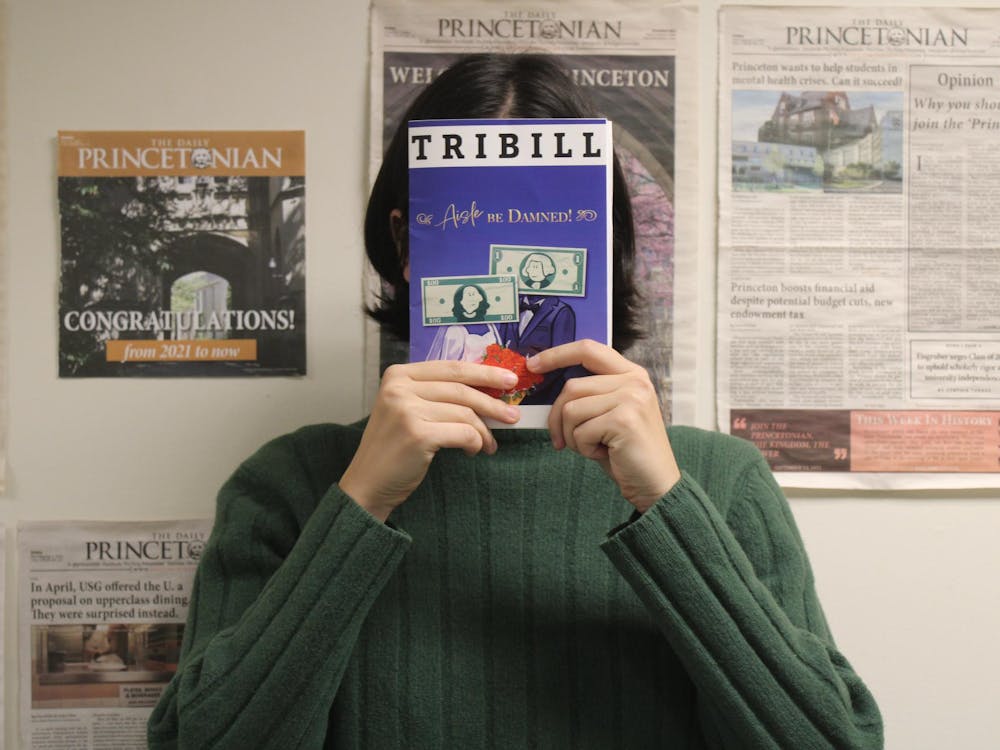To finish the academic year 2015-16 season, Princeton University Players presented “City of Angels” in the Frist Film/Performance Theater, directed by Michelle Goldman ’18, and currently presents “Dogfight” in the Class of 1970 Theater in Whitman College, directed by Abby Jean-Baptiste ’18. Both musicals focus on prominent moments in America in the twentieth century: “City of Angels” pays homage to film noir, a style popular in Hollywood in the 1940s and “Dogfight,” set in the 1960s, follows three “jarhead” Marines the night before they head out to fight in Vietnam. While PUP’s production of “City of Angels” features little thematic substance, PUP’s “Dogfight” not only focuses on themes of masculinity and beauty, but also allows for Jean-Baptiste to challenge and complicate its themes.
The frame story of “City of Angels” features Stine (Joe Redmond ’18), a writer who has compromised on his dream to be a great novelist by writing popular but substance-less screenplays. Stine’s main character and foil is Stone (Stefan Lee ’18), a misogynistic, constantly inebriated private investigator. When the wealthy Alaura Kingsley (Allison Light ’18) approaches Stone, she brings him a new case: her daughter-in-law, Mallory (Alexandra Mendelsohn ’18) has gone missing, and Kingsley needs Stone to find the girl.
As “City of Angels” traces events both in the real and literary worlds, the audience meets a number of outrageous characters and experiences a handful of strong performances. In the most entertaining twist in the story, Stone has a run in with the mob, led by Munoz (played by Luke Soucy ’19).
Two of the strongest performers in the show are Carly Maitlin ’19 as the eager-to-please Oolie/Donna and Cecily Polonsky ’19 as the love interest Gabby/Bobbi. Maitlin and Polonsky’s performance of “What You Don’t Know About Women” is easily the highlight of the production, a production that otherwise has spotty musical performances, with the other exception being the dapper balladeer’s (Calvin Wentling ’18) performances during scene transitions.
On the acting side, Evan Gedrich ’18 steals the show with his outrageous performance as the qualmless producer Buddy and both Redmond and Lee are well suited in terms of acting, though both musical performances are strained.
Technical elements are poor: lighting is sloppy, often failing to light faces; scene changes are absurdly long; and, the mixing of vocals with music skewed. The space itself — Frist Film/Performance Theater — is unsuited for live theater. Neither an intimate black box nor a traditional proscenium stage, Frist boasts shoddy acoustics and sight-lines, making it a space likely only good for film viewings and improv comedy. The band — in a happy contrast to most student pits — gets the job done.
Costumes (Rebecca Schnell ’18) are smatterings of pieces from actors’ closets and other modern pieces. Costuming mistakes are egregious: one actress is clearly uncomfortable in her too-short and too-revealing slit skirt and actors, when not wearing modern shoes, wear tan character shoes with black tights — an inappropriate look for the period.
Though blocking is solid, choreography is unoriginal and — frankly — uncomfortable to watch. The actors might make an effort, but the vision simply doesn’t come through.
Just as there is little substance to Stine’s screenplays, so is there little substance in PUP’s “City of Angels.” The production does nothing to thematically or artistically challenge or advance theater at Princeton, hardly even providing an evening of entertainment.
“Dogfight,” though largely a different story, suffers from some of the same symptoms as “City of Angels.”
In the titular “Dogfight,” Marines Birdlace (Anthony Sermarini ’19), Boland (Charlie Cohen ’19) and Bernstein (Stephen Chao ’19) vie for pooled money, with the winner being the man who brings along the most ugly date. The plot is trite — something a la the 1998 French comedy “Le Dîner de Cons” and its 2010 American adaptation, “Dinner for Schmucks,” starring Steve Carell and Paul Rudd — so it is only expected that Birdlace ends up falling for his “schmuck” date, Rose (Deirdre Ricaurte ’16).
Director Jean-Baptiste notes the inadequacies in the text and attempts to complicate the plot by casting women as Marines — Lena Volpe ’19 plays Stevens and Jessica Bailey ’19 plays Fector. Unfortunately, this complication happens on the sidelines: these characters take minor roles in comparison to the lead and supporting Birdlace, Boland and Bernstein. Additionally, when Jean-Baptiste attempts to comment upon the definition of beauty, she decides that “the primary perception of ugliness would be through the eyes of the marines,” as indicated in her Director’s Note. Why, then, does Ricaurte wear makeup to make it seem as if Rose has bushy eyebrows? Doing so superimposes the Marines’ perception of ugliness onto Rose, forcing the audience to view the woman as the Marines do. Would it not have been better for Ricaurte to wear no makeup and therein establish significant dissidence between what the Marines and the audience see?
Ricaurte is by far the strongest performer in the production, excelling in her portrayal and vocal performance as the awkward musician Rose. Volpe ’19 and Bailey ’19 give solid performances and the many freshmen in the production promise to be assets to the Princeton theater community. Kirsten Hansen ’19 gives a great performance as the prostitute Marcy; she regularly receives laughter and sings the titular song with aplomb. Indeed, it is her rape scene that is the most compelling moment in the production. Jean-Baptiste makes bold choices in her interpretation of Marcy's rape, a 30-second moment that pushes the audience into discomfort and disillusionment. More than any other moment in PUP's 2015-16 season, this is the single most excellent use of the stage for social commentary and is a clear indication of Jean-Baptiste's skill as a director.
Technical elements of the production are mixed. The set consists of poorly placed propaganda posters, actors’ blocks and piano benches (Nico Krell ’18, Megan Berry ’19, Nick Nelsonwood ’18 and Will Alvarado ’19). Choreography (Victoria Gu ’18 and Lauren Wodarski ’17) is clever but sorely implemented, and only occasionally well executed: "Hey Good Lookin," for example, features fun, upbeat choreography that the actors obviously enjoy performing, making it the highlight of the first act, but the choreography in “Dogfight" gets off on the wrong foot: at the very beginning of the production, actors portraying sleazy Marines slow dance like middle schoolers. On the positive side, the use of a moveable costume rack is excellent, and costumes are far above par for a Princeton production (Isabel O’Connell ’18). The pit is an enormous strength of the production and the single best pit PUP has seen in years (directed by Lou Chen ’19).
“City of Angels”
Pros: talented cast and crew, clever musical, catchy tunes
Cons: poor thematic execution, poor technical elements, too long
Paws: 1/5
“Dogfight”
Pros: plenty of freshmen talent, strong performances from Ricaurte ’16 and Hansen ’19, dreamy “First Date / Last Night”
Cons: cringe-worthy portrayal of guerrilla warfare in Vietnam, shaky vocal performances, poor acting at points
Paws: 3.5/5
“Dogfight” played in the Class of 1970 Theater in Whitman College on April 14 and 15 at 8 p.m. and April 16 at both 2 p.m. and 8 p.m.






